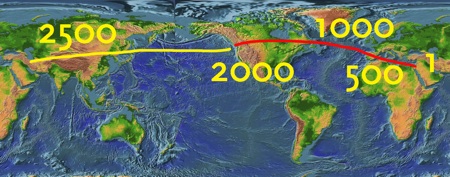The Next 1000 Years of Christianity
I am a follower of Christ. I find it useful in my own life to frame my spiritual experience in the language of a 2,000 year old religion. I think this old perspective still has a lot of bite in it, even intellectual bite. There’s a tendency to want to write Christianity off as ancient history and impotent ignorance, but again and again smart, sane, civil people have their lives remade by it, and the belief sticks around. I think that at its core Christianity will continue to poke and sharpen and transform people in the future. But, of course, it will have to be interpreted yet again by another era. Let’s just say that its current vocabulary is not entirely up to date.
Despite the fact that Christianity is two millennia old, and often takes a longer view, it has been myopic when it comes to the future. For the past 2,000 years it has offered only one scenario for the future: the world will end tomorrow. You’d think that after getting it wrong every day for 2,000 years it would come up with at least one alternative scenario.
In my casual search for published alternative scenarios for the future of Christianity, I did not find much, even in very progressive liberal branches of the faith. Speculators are hindered by fear of sounding heretical, by the difficulty in predicting anything that far ahead, by doubt that speculations are worthwhile, and by the completely false notion that Christianity is unchanging.
I am foolish enough to dive in where saints fear to tread. I’ve been hanging out with the emerging generation of American Christian leaders. They are making a new vocabulary for the traditional faith. They are re-ordering some traditional priorities. They have questions. Lot’s of them. Gabe Lyons, an emerging church guy, started a conference called Q (for questions). It’s sort of like a Christian TED.
At the first Q Conference two years ago I gave a talk called The Next 1000 Years of Christianity (video here). It is my attempt to describe a few positive scenarios for the next millennial. I did not bother with negative scenarios (negative for believers), such as Christianity disappears in 100 years, because they were predictable, common, and obvious. (But as one friend noted; to retain symmetry the talk should really be about the next 2,000 years to match the last 2,000. I agree but 1,000 years was already so far off the charts for this crowd that I felt no one would listen about 2,000 years.)

One idea: The circumnavigation of the “center” of Christianity, starting in Jerusalem, heading west to Europe, then to the Americas, then to Asia and finally returning to Africa and Jerusalem.
By the standards of the title, this talk failed. I did not come anywhere near outlining a 1,000-year scenario for Christianity. Rather I introduced the idea of scenarios and offered some forecasts for the near future. My main point was to confirm the continued evolution of Christianity, both in the past and into the future, and to demonstrate the value of having multiple visions of what will happen next.
In that way I think the talk succeeded. Uncountable number of people let me know that they had “never even thought about” the next 1,000 years of their faith. I got the sense they did not know they were allowed to. Now they do. I wrote my talk up as a monograph, which the Q folks say is one of their most popular essays.
The Q conference features speakers talking both about the Christian church and the culture at large. It represents the arm of change within the American Protestant Evangelical branch of Christianity — the strand that has been most politically active in the US in recent decades. If you’d like to have direct contact with the emerging church of the next generation, this is a good venue to touch many edges of it at once.

